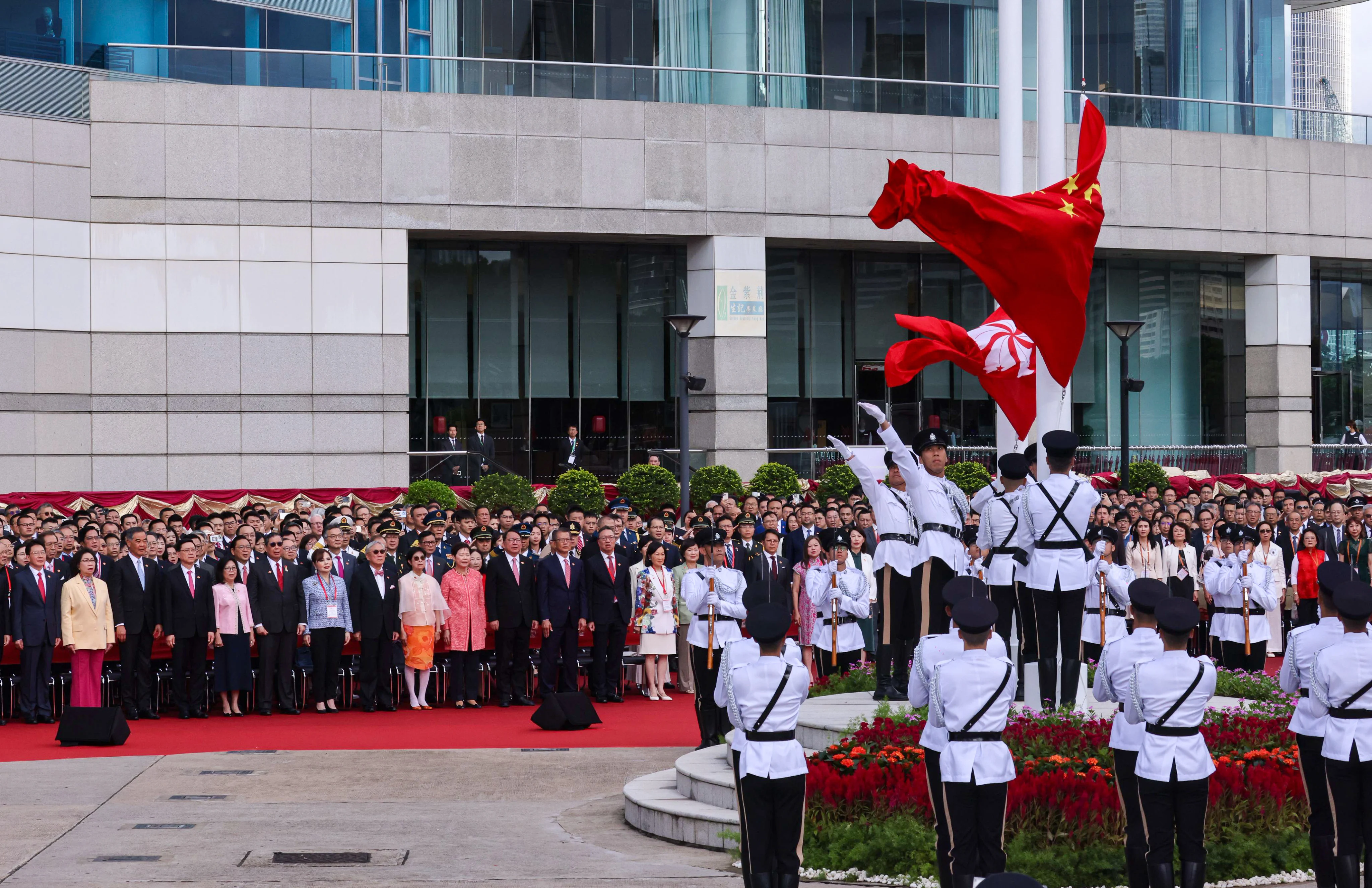By Jeffie Lam
Hong Kong’s leader has vowed to be a “reformer” that rises to challenges rather than becoming a “complacent idler” in the face of the economic restructuring and geopolitical tensions, as he enters his fourth year in office.
In a speech to mark the 28th anniversary of the city’s handover to Chinese rule, Chief Executive John Lee Ka-chiu on Tuesday also laid down three priorities in his governance: boosting development backed by security; expediting the Northern Metropolis megaproject near the border with mainland China; and improving residents’ livelihoods.
Lee said he had full confidence in Hong Kong’s development, as long as the city was committed to fully seizing opportunities, undertaking reforms and fostering innovation.
He cited a Chinese saying that describes a hard task becoming easy with determined efforts and an easy task getting difficult with inaction.
“We would rather be reformers who rise to challenges than become complacent idlers,” Lee declared at the reception held at the Hong Kong Convention and Exhibition Centre in Wan Chai.
“Amid an ever-changing geopolitical landscape and constantly increasing uncertainties, Hong Kong is able to showcase exactly to the world the certainties of safety, stability and development opportunities. These are precisely what the world needs and seeks.”
Lee stressed that the opportunities available to Hong Kong still outweighed the challenges it faced amid the economic restructuring, thanks to the advantages of the “one country, two systems” principle.
Elaborating on his three priorities, Lee vowed to safeguard “high-quality development” with “high-level security”, stressing the city would remain vigilant in safeguarding national security as it fostered economic growth.
“We will deepen international exchanges and cooperation, explore new markets and opportunities, bolster the provision of extensive supply chain services, expand and strengthen regional trade with the aim of offsetting the risk of over-reliance on a single market in business trade,” he said.
Lee also pledged to speed up the development of the Northern Metropolis, a project near the border with mainland China that aims to turn 30,000 hectares (74,130 acres) of land in the northern New Territories into an economic powerhouse and housing hub.
“By introducing new concepts and new methods, removing potential barriers and leveraging market forces, we aim to enhance the speed and efficiency of developing the Northern Metropolis, the San Tin Technopole, and the Hong Kong Park of the Hetao Shenzhen-Hong Kong Science and Technology Innovation Co-operation Zone,” he said.
The government would focus on attracting top scientific research talent from around the world in a bid to promote the city as a hub for high-calibre talent, he added.
Lee also said his administration would in the coming years “proactively” improve Hongkongers’ livelihoods in areas including housing, health, education, welfare and overall quality of life, while pressing ahead with various railway projects.
Looking back on his three years in office so far, the city leader said his team had attracted over 210,000 high-quality migrants and 84 strategic enterprises to Hong Kong, enhanced the competitiveness of the financial sector and shortened the waiting time for public housing by over nine months to 5.3 years, among other achievements.
“We have fulfilled the constitutional duty by enacting the local legislation for Article 23 of the Basic Law, a historic task long envisioned by previous terms of the government but unrealised until now,” he said, referring to the Safeguarding National Security Ordinance enacted in March last year. “We have rebuilt a safe Hong Kong.”
The event was attended by the central government’s top representatives in the city, including Zhou Ji, the new director of the liaison office, Dong Jingwei, the head of Beijing’s Office for Safeguarding National Security, and Cui Jianchun, the nation’s top diplomat in Hong Kong.
Leaders of the executive, legislative and judicial branches, as well as representatives from different sectors, also attended the reception, which followed a flag-raising ceremony at Golden Bauhinia Square earlier in the morning.
Around 50 police officers were seen guarding different entrances to the event venue. No protest attempts were spotted.
